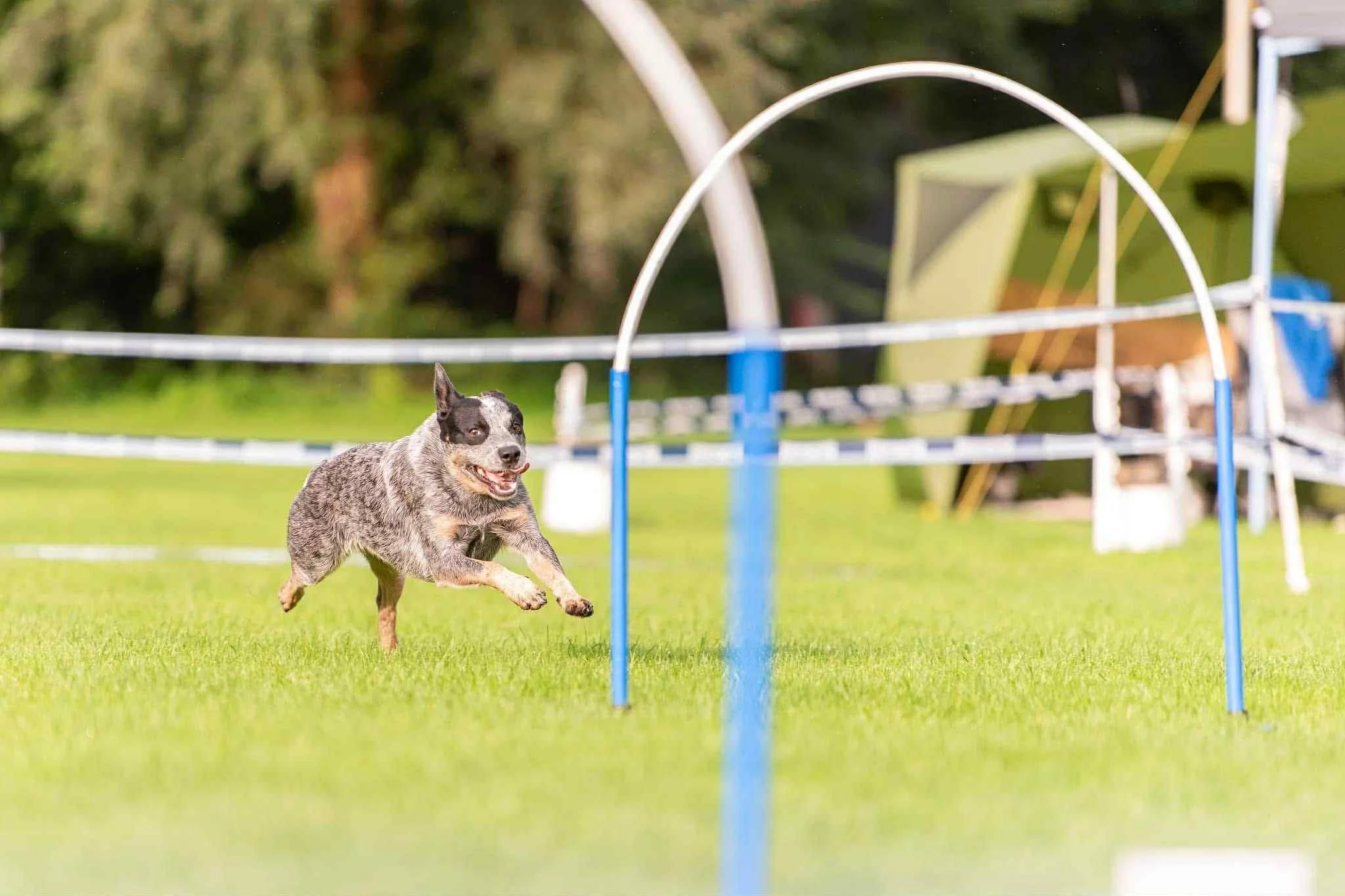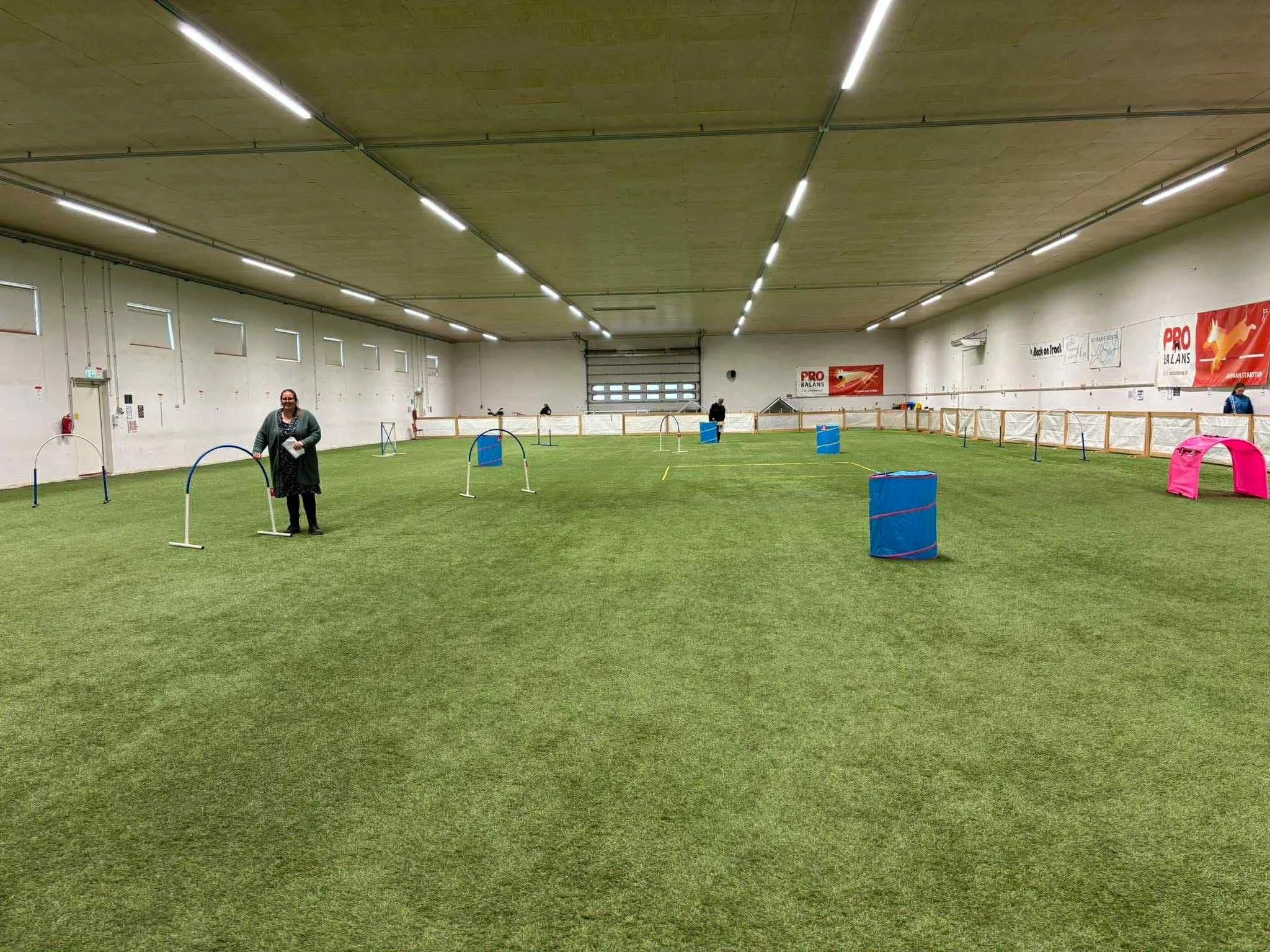Essential skills in hoopers: Insights from Dutch trainers and a judge
Veronique’s dog Lola going around a barrel.
This is the second part of a blog post series called “Hoopers in the Netherlands”. Blog posts are based on an interview with Lisa Nijhof and Veronique De Boer-Wildeboer. Lisa is hoopers trainer, judge and coach and Veronique is hoopers trainer and coach. Read more on Lisa and Veronique here.
In this post, Lisa and Veronique share their thoughts on the most important skills for everyone involved in hoopers: the dog, the handler, the trainer, the dog-handler team and the judge. Their perspectives highlight how success in hoopers depends on building strong foundations and fostering mutual trust.
Read other parts:
PART 1: Building skills and connection: Dutch perspectives on hoopers training
PART 3: The future of hoopers: unity, growth and joy (published on 29th August)
Key skills for a hoopers dog
In hoopers, dogs need to be confident working away from their handler. They must be able to maintain motivation, focus on the task and make quick, independent decisions even at a distance. Developing these qualities starts with strong foundations in training, where the dog learns to trust its own abilities and respond reliably to cues without constant guidance.
“The dog needs to work independently and make quick, clear decisions. Many dogs like to stay close to the handler, but in hoopers they need to enjoy running on their own and at the same time responding to cues from a distance.” Veronique
Key skills for a hoopers handler
In hoopers, handlers play a crucial role in guiding their dogs through courses while maintaining clarity and calmness. A good handler understands their dog’s strengths and weaknesses and adapts their communication accordingly. Consistency in training is important, but so is flexibility when the dog’s needs or the situation changes. Success requires patience, focus and the ability to stay positive even when things don’t go as planned. Being able to read the course, anticipate challenges and adjust on the fly are essential skills that develop with experience.
“You need to know your dog’s strengths and limits. After that, being consistent and flexible at the same time your training approach is vital.” Lisa
Also patience plays a big role - the handler needs to let the dog learn without constant micromanaging. In our club we really like shaping as it helps dogs to start thinking instead of being dependent on the handler.
Lisa’s dog Joa running on a hoopers course.
Key skills for a hoopers dog-handler team
At the heart of hoopers lies the partnership between dog and handler. This relationship is built on mutual trust, where the dog confidently follows cues and the handler believes in the dog’s ability to perform independently. A successful team communicates smoothly, understands each other’s strengths and limitations and stays connected even at a distance. Equally important is the ability to maintain a joyful and positive atmosphere, ensuring that both the dog and handler enjoy the process and grow together through each challenge.
“Mutual trust is the foundation. The handler needs to trust the dog to do what it was taught, and the dog must trust the handler’s cues.” Lisa
Key skills for a hoopers coach
A great hoopers coach needs strong knowledge of shaping, reward placement and motivation, but also understanding how to bring out the best in each dog-handler team. This involves recognizing the unique abilities and limitations of both dog and handler, adapting teaching methods to suit their needs and creating a learning environment where progress feels achievable.
Setting clear goals, breaking down complex skills into manageable steps and fostering motivation are all essential. Trainers also need creativity and flexibility to adjust when standard approaches don’t work, always keeping the training fun and positive for everyone involved.
“Estimating what’s possible for each team and thinking outside the box when needed are crucial skills.” Veronique
Lisa was judging and Veronique assisting in Finland’s WHOC qualifications in May 2025.
Key skills for a hoopers judge
In the Netherlands judges usually say before every competition “It doesn't matter what happens, you always take the most fun and the best dog home.”
Judges in hoopers carry the responsibility of ensuring that courses are safe, fair and engaging for all competitors. They need a deep understanding of how dogs move through courses and how different designs can impact the team’s performance. Balancing challenge with flow is key, as is designing courses that suit both fast and slower dogs. A good judge promotes a positive atmosphere at competitions, supporting sportsmanship and celebrating the achievements of all participants, regardless of their results.
“I think you need a certain type of perfectionism to be a good judge. I test my courses and I learn from every course. I really like to analyze dogs lines and how different angles of obstacles affect them.” Lisa
A shared vision of growth
Whether as a dog, handler, trainer or judge, success in hoopers comes from continuous learning and a commitment to connection and joy. As Lisa puts it, “It’s about enjoying the journey with your best friend and striving to understand each other better every day.”
In the last part of this series, we will get to know the Dutch hoopers and Lisa and Veronique will share their thoughts on hoopers future hopes.
Veronique and Lisa visited also some sights in Finland.
Happy Hoopers - for hoopers handlers and coaches
Happy Hoopers is a site designed for hoopers enthusiasts and coaches. Here you’ll find information about the sport, ideas to inspire your training, and insights that go a little beyond hoopers itself. All with the goal of helping you and your dog enjoy the journey together.
The site was founded by Tiina Wikström, a hoopers instructor, coach trainer, and mental performance coach. Tiina is passionate about supporting handlers and coaches in creating positive, motivating, and enjoyable training experiences for both dogs and humans.
Whether you’re just starting your hoopers adventure or you’re an experienced trainer looking for fresh perspectives, Happy Hoopers is here to spark your creativity and keep your sessions fun and purposeful.
Learn more: www.happyhoopers.fi




